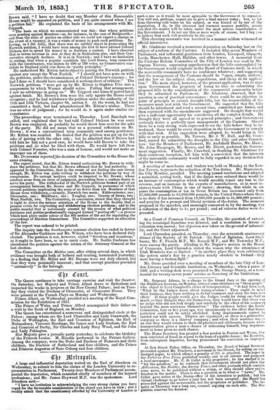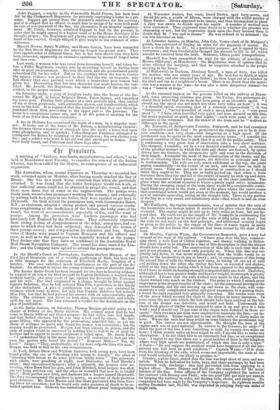t4t Z ernialis.
A large and influential deputation waited on the Earl of Aberdeen on Wednesday, to submit to him the claims of the London University to re- presentation in Parliament. Twenty-four Members of Parliament accom- panied the deputation, which consisted chiefly of members of the learned professions ; and Mr. James Heywood M.P. was the spokesman. Lord Aberdeen said-
" I have no hesitation in acknowledging the very strong claims you have urged for the favourable consideration of the object you have in view ; and readily admit that the constituency afforded by the University of London is such a one as it would be most agreeable to the Government to organize. You will not, perhaps, expect me to give a final answer today ; but, so fur from throwing cold water on the subject, as was hinted at by one of the deputation, I do, in the sincerest and warmest manner possible, assure you that the matter will be taken under the most serious consideration of the Government. I do not say this as mere words of course, but I beg you to believe that such will positively be the case."
This cheering assurance was received in a manner seldom witnessed at official interviews.
Mr. Gladstone received a numerous deputation on Saturday last on the subject of a reform of the Customs. It included fifty-seven Members of Parliament, and influential gentlemen from London, Liverpool, Glasgow, Leeds, Manchester, Hull, Halifax, and other towns. A memorial from the Customs Reform Committee of the City of London was read by Mr. Ingram Travers, expressing apprehension that the bills contemplated by the Government would originate in the Board of Customs itself, in which the mercantile community have no confidence whatever ; and suggesting that the management of the Customs should be "open, simple, uniform, and the law on the subject clear, expeditious, and cheap in its applica- tion." The main object, however, of the present application, was to urge upon Government the propriety of losing no time in submitting the proposed bills to the consideration of the commercial community before they be submitted to Parliament. Mr. Gladstone observed, that the question is one of practical convenience: there could be no objection in point of principle to submit draught-bills, but the responsibility of the measures must rest with the Government. He suggested that the bills should be introduced and read a second time, committed pro forma, and then reprinted with the amendments suggested. Ile thought that would give a sufficient opportunity for considering all the complex details. He thought they were all agreed as to general principles ; and Government certainly desire a perfectly open management of the Customs. Should there be a very strong wish expressed to see the bills before they be in- troduced, there would be every disposition in the Government to comply with that wish. If his suggestion were adopted, he would bring in the bills as early as possible. Mr. Travers, Mr. J. W. Hall, and Mr. Craw- ford, argued for submitting the draughts to the City and other Commit- tees : but the Members of Parliament, Mr. Archibald Hastie, Mr. Hume, Mr. John Macgregor, Mr. Brown, and Mr. Divett, preferred the Govern- ment suggestion. Finally, Mr. Crawford, in thanking Mr. Gladstone for their courteous reception, left him with a conviction that the interests of the mercantile community would be fully regarded in any decision that might be come to.
A meeting of merchants and traders was held on Monday at the Loris don Tavern, to promote the reduction of the Tea-duties. Mr. Misterman the City Member, presided. The meeting passed resolutions and adopted. a memorial, setting forth, that if the duties were reduced there would be an increase of consumption which would speedily repair any leas to the revenue, and an increase in the exports of manufactures, as in most in- stances trade with China is one of barter ; showing, that while in six years the consumption of tea in Great Britain has increased only from 57,600,000 pounds to 65,000,000 pounds, in the United States where there is no duty it has increased from 18,000,000 pounds to 34,300,000 pounds; and praying for a prompt and liberal revision of the duties. The measure proposed in the speeches, and seemingly concurred in by the meeting, was a reduction of the duty to Is. per pound ; and ad valorem duties were de- precated.
At a Court of Common Council, on Thursday, the questioi of extend- ing the municipal franchise was debated, and a resolution in favour of extension was moved ; but objection was taken on the ground of informal- ity, and the Court adjourned.
Lord Clarendon presided, on Thursday, over the seventieth anniversary- dinner of the Society of St. Patrick : the Earl of Eglinton, Lord Shel- burne, Mr. F. French M.P. Mr. Russell M.P., and Mr. Towneloy M.P., were among the guests. Alluding to Mr. Napier's motion in the House of Commons, Lord Clarendon stated the reason why the attendance of Irish Members was so limited : "in another place they were celebrating the patron saint's day by a practice nearly obsolete in Ireland—they were having a faction-fight."
Mr. Grote presided over a meeting of members of the late City of Lon- don Literary and Scientific Institution, on Wednesday; when a purse of 2301. and a writing-desk were presented to Mr. George Stacey, as a testi- monial for twenty-seven years' service as Secretary of the Institution.
Mr. Sergeant Adams, in a charge to the Grand Jury at the opening of the Middlesex Sessions, on Monday, uttered some strictures on "those people" who object to Lord Campbell's views of transportation. "It had been said, 'What do the Judges know about transportation ? They ought to mind their business, they have nothing to do but transport and carry the laws into effect.' If these people would give the Judges credit for doing one-half as much as they thought they did themselves, they would know that there was no judge who did not look deeply and carefully to the effect of his sentences beyond the mere sentences themselves." The evidence before the Lords' Committee, four or five years ago, was unanimously to the effect that trans- portation could not be safely abolished. Long imprisonments cannot be carried out with success. Thieves are organized ; as there is a goldsmiths' company so there is a thieves' company ; and when their sentence was at an end they would return to their old practices and old haunts, because while transportation gives a man a chance of redeeming himself; long imprison- ment at home gives no such chance. The Home Secretary has granted a free pardon to Paxton and Wynn, tee men convicted of fraud in regard to the lease of a public-house ; the lit:corder, from subsequent inquiries, having pronounced the conviction an improper one.
At Bow Street Police Office, on i Thursday, the Board of Inland Revenue proceeded against Mr. Truelove, a newsman n the Strand, for selling an un- stamped paper, to which offence a penalty of 20/. is attached. The paper is the Potteries Free Press, published weekly', and to all intents and purposes a local newspaper. Mr. C. D. Collet is the proprietor ; he has started it to ttrirentehetnretttiee.73,u"ilailler htehecoRnatecnds, that Government should not allow the Uo Times, and other journals which contain some news, to be published without a stamp, or thelishould allow entire freedom in the matter. There is also a question as to w at is "news." Mr. Collet gave notice at the Stamp-office of his intention to publish; but his virtual challenge to go before a jury has not been accepted: the Board has proceeded against the newsvendor, not the proprietor or publisher. The in- quiry on Thursday was a long one, counsel arguing on each side. The Ma- gistrate reserved his decision. John Taggart, a warder in the Pentonville Model Prison, has been fined 501. by the Clerkenwell Magistrate for privately conveying a letter to apri- soner. Taggart got money from the prisoner's relatives for his services; and it is alleged that he offered to assist him to escape if he were well paid. In case of non-payment of the fine, the alternative is six months' imprison- ment. Mr. Come, however, admitted Taggart to bail for the present, in order that he might appeal to h higher court or to the Home Secretary if he thought proper ; the Magistrate not placing entire dependence on the state- ment of the convict, though obliged to give weight to the evidence of other witnesses.
Harriet Brown, Sarah Welfare, and Henry Garcia, have been remanded by the Bow Street Magistrate for uttering forged ten-pound notes. They were apprehended at different times, but it has been shown that they have been connected, apparently in extensive operations by means of forged notes and base coin.
Last week, a woman who was saved from drowning herself, and taken be- fore a Police Magistrate, excited pity by describing herself as having been once in good circumstances. She was liberated, and the goodnatured public subscribed 721. for her relief. But on the morning when she was to receive the money, evidence was produced to show that she was an impostor, who had oftener than once pawned work which a benevolent poor woman had given her. Discovering that her true character was made known, she van- ished. Mr. Arnold, the Magistrate, has since returned all the money sub- scribed, to the proper owners.
On Saturday night, a gang of burglars broke into the house of the Re- verend Mr. Pigott, in Lower Belgrave Street, Eaton Square, and ransacked the lower part. Finding little plunder of a very portable kind, they carried off six or seven greatcoats, with umbrellas, gloves, and handkerchiefs, which were in the hall. It is supposed that the number of hats they saw there in- timidated them from proceeding to the upper part of the premises. The house is a conspicuous corner one, and is at the point of meeting for the beats of no fewer than three constables.
A fire in Holborn has occasioned the death of a man, in a singular man- ner. It broke out at the house of Mr. Button, a manufacturing chemist; the firemen threw a number of chemicals into the road ; a horse trod upon some phosphorus, and it ignited ; Police-Sergeant Patterson attempted to extinguish the flames by stamping on the phosphorus his own clothes took fire; and a soldier who went to his aid was also enveloped in flames. Both were badly burnt, and Patterson died three days after.



























 Previous page
Previous page